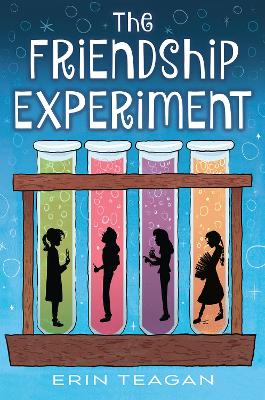Reviewed by Briana @ Pages Unbound on
The Friendship Experiment, then, is about Madeline’s struggle to adjust to a new school. She actually knows several students there from her elementary school, so things are not quite as dire as she makes out, but she’s hesitant to connect with anyone other than her best friend, who is attending a fancy, apparently more challenging, private school. She tries to get through the tough times by writing standard operating procedures a habit she picked up from her (world famous scientist) grandfather in a super-secret notebook.
I think the STEM aspect of the novel will draw in a lot of readers. Madeline is serious about microbiology and her experiments and, as I said, she gets inside access to real labs and lab equipment at the nearby university. Author Erin Teagan is a former research scientist, and her love and knowledge of science shines through the writing. There’s also a character who’s going to be an astronaut (she went to the “real Space Camp” over the summer), as well as a boy obsessed with dinosaurs. A bit more stereotyped are the non-STEM characters—a spelling bee champ who literally walks around spelling 30% of the words she uses, and a girl who does nothing but carry around encyclopedias and read them all day. Still, the celebration of smart kids (mostly girls, but some boys) is exciting, and I think a lot of readers will appreciate it.
My main struggle with the book is that the protagonist is not a likable character; she’s unpleasant and frequently mean to everyone around her, ranging from her best friend to her sister to the kids at her new middle school. Now, I don’t need characters to be likable to believe a book is good, and I understand that Madeline’s meanness is in fact the point of the story; she has to learn to recognize her own personality flaws and then to interact with others in more positive ways. And yet…I didn’t find reading about her fun. She’s not someone I would want to hang around in real life, so it makes sense I didn’t find hanging out with her for several hours while reading the book fun either. There’s nothing wrong with the technical execution of the book and Madeline’s character arc, but if I’m rating the book for “personal enjoyment,” I admit I frequently didn’t feel any.
The Friendship Experiment is in many ways a good book, and much of it struck me as unique from what I typically read in middle grade fiction. However, my lack of personal connection with the book (and lack of sense that I would have connected with it any better when I was actually in middle school myself) means it’s probably not going to be high on my list of books I personally recommend to people. However, if you’re looking for a book with girls in STEM or even just a book about adjusting to a new middle school, this could be a good choice for you.
Reading updates
- Started reading
- 20 August, 2017: Finished reading
- 20 August, 2017: Reviewed
